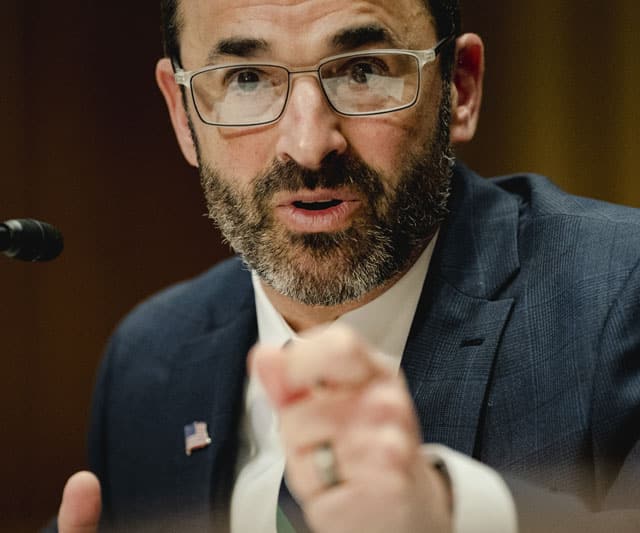The IRS said on July 24 that it would immediately curb the practice of sending agents to make surprise visits to homes and businesses, scaling back a policy that for decades was central to its efforts to collect unpaid taxes amid political backlash and increasing threats to its employees.
The change comes as the IRS embarks on a multibillion-dollar modernization project that aims to upgrade technology, ramp up enforcement of the tax code and improve customer service. It also coincides with increased scrutiny of the tax collection agency, which has faced criticism from Republicans over perceptions of political bias and from taxpayers who claim that its tactics are overly aggressive.
“We are taking a fresh look at how the IRS operates to better serve taxpayers and the nation, and making this change is a common-sense step,” Daniel Werfel, the IRS commissioner, said in a statement. “Changing this long-standing procedure will increase confidence in our tax administration work and improve overall safety for taxpayers and IRS employees.”
Werfel, in remarks to reporters, portrayed the new approach as part of the agency’s transformation, which aims to use IRS resources more efficiently and work more constructively with taxpayers. Werfel, who has been in the job for four months, said he wanted to end the public perception of IRS employees going door to door to collect taxes.
The agency has been trying to project a more customer-focused approach to taxpayers while Republicans have been fanning fears that the tax collector is hiring an army of 87,000 new agents to shake down small businesses and the middle class. The antipathy toward the IRS has made the work of its agents more dangerous; last year, the agency initiated a comprehensive security review after misinformation and false postings on social media led to threats directed at employees.
The IRS said on July 24 that unannounced visits would continue only in a few “unique” circumstances and that they would generally be replaced with mailed letters to schedule meetings. Werfel said the in-person visits were generally used to collect tax debts of more than $100,000 and that they were employed to demonstrate that the agency was closely tracking the cases of taxpayers. Under the new system, taxpayers who ignore written correspondences from the IRS could eventually face penalties or liens on their property.
The agency typically makes tens of thousands of unannounced visits to households and businesses each year and will continue to do so only in cases involving summonses and subpoenas or the seizure of assets. Those types of cases usually occur less than a few hundred times per year, the IRS said.
It employs about 2,000 unarmed revenue officers who usually make unannounced visits to discuss taxes owed or missing returns. Sometimes they make visits without warning if they think a business could be falling behind on withheld employment taxes or to collect a debt.
The criminal investigation unit of the IRS, which does employ armed agents that visit homes and businesses, will not be affected by the change of policy for revenue officers.
Republicans have made it a priority to impede the Biden administration’s plans to beef up the IRS with $80 billion that it was given as part of the Inflation Reduction Act last year. They successfully cut $1.4 billion of the agency’s funding in the debt limit legislation that Congress passed in June and reached a deal to claw back another $20 billion as part of the final budget agreement that lawmakers are expected to pass this year.
In recent months, lawmakers and anti-tax groups such as Americans for Tax Reform have been raising questions about unannounced visits by IRS agents. As examples of overreach, they have pointed to a raid in June on a gun shop in Montana — where agents seized personal information of gun owners and buyers — and a visit in April by agents to the Florida offices of investor Jeffrey Gundlach, which was apparently the result of a clerical error.
Werfel suggested that ending unannounced visits was a response to the prevalence of scammers who pose as agents. He said this had created additional anxiety for taxpayers and more stress for revenue officers.
“We have the tools we need to successfully collect revenue without adding stress with unannounced visits,” Werfel said, adding that improved analytics would allow the agency to reach its compliance goals. “The only losers with this change in policy are scammers posing as the IRS.”
The IRS commissioner said he expected that the new policy would mitigate the concerns that members of Congress had expressed about unannounced visits.
The new policy is also expected to be welcome within the IRS, where revenue officers have expressed growing concern about their safety when making the visits. In some cases, officers have been confronted by hostile taxpayers wielding weapons.
Tony Reardon, the national president of the National Treasury Employees Union, said the decision to halt unannounced field visits was welcome.
“The safety of IRS employees is of paramount importance,” he said, “and this decision will help protect those whose jobs have only grown more dangerous in recent years because of false, inflammatory rhetoric about the agency and its workforce.”
c.2023 The New York Times Company.This article originally appeared in The New York Times.







